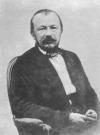Biography
Gérard de Nerval (French pronunciation: [ʒeʁaʁ də nɛʁval]) (May 22, 1808 – January 26, 1855) was the nom-de-plume of the French writer, poet, essayist and translator Gérard Labrunie, one of the most essentially Romantic French poets.
His life and several of his works were influenced by his infatuation for an actress named Jenny Colon, who died in 1842. His works are notable for the author's charming personality and intelligence, his poetic vision and precision of form. His friend and fellow writer Théophile Gautier wrote a touching reminiscence of him in 1867 (La Vie de Gérard) which was included in Gautier's Portraits et Souvenirs Litéraires, published posthumously in 1875. wo years after his birth in Paris, his mother died in Silesia while accompanying her husband, a military doctor, a member of Napoleon's Grande Armée. He was brought up by his maternal great-uncle, Antoine Boucher, in the countryside of Valois at Mortefontaine. On the return of his father from war in 1814, he was sent back to Paris. He frequently returned to the countryside of Valois during holidays and later returned to it in imagination in his Chansons et légendes du Valois.
His talent for translation was made manifest in his prose translation of Goethe's Faust (1828), the work which earned him his reputation; Goethe praised it, and Hector Berlioz later used sections for his legend-symphony La damnation de Faust. Other translations from Goethe ensued; in the 1840s, Nerval's translations introduced Heinrich Heine's poems to French readers of the Revue des deux mondes. During the 1820s at college he became lifelong friends with Théophile Gautier and later joined Alexandre Dumas, père, in the Petit Cénacle, a bohemian set affiliated to Charles Nodier, which was ultimately to become the Club des Hashischins. Nerval's poetry is characterized by Romantic deism. His passion for the "spirit world" was matched by a decidedly more negative view of the material one: "This life is a hovel and a place of ill-repute. I'm ashamed that God should see me here." Among his admirers was Victor Hugo.
Gérard de Nerval's first nervous breakdown occurred in 1841. In a series of novellas, collected as Les Illuminés, ou les précurseurs du socialisme (1852), on themes suggested by the careers of Rétif de la Bretonne, Alessandro Cagliostro and others, he described feelings that followed his third insanity.
Increasingly poverty-stricken and disoriented, he committed suicide during the night of January 26, 1855, hanging himself from a sewer grating in a narrow street named Rue de la Vieille-Lanterne. He left a brief note to his aunt: "Do not wait up for me this evening, for the night will be black and white."
The poet Charles Baudelaire observed that Nerval had "delivered his soul in the darkest street that he could find." The discoverers of his body were puzzled by the fact that his hat was still on his head. The last pages of his manuscript for Aurélia were found in a pocket of his coat. He was interred in the Père Lachaise Cemetery in Paris, at the expense of his friends Théophile Gautier and Arsène Houssaye, who published Aurélia as a book later that year.
The complete works of Gérard de Nerval are published in three volumes by Gallimard in the collection Bibliothèque de la Pléiade.






